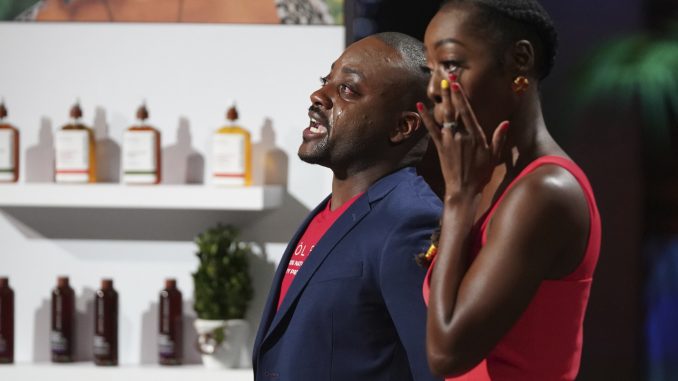
On Jan. 12, Stéphane Jean-Baptiste and Yve-Car Momperousse appeared on Shark Tank, exactly 10 years after a 7.0 magnitude earthquake hit Haiti in 2010.
The three million lives that were threatened in the 2010 earthquake was one of the things on their mind as they pitched their brand.
Jean-Baptiste, a 2006 communications alumnus, and Momperousse went on ABC’s Shark Tank, a show that gives beginning entrepreneurs the chance to earn investors, last month to pitch their beauty brand Kreyol Essence.
The brand’s inspiration comes from Haiti, as it employs female workers in the country and sources products for its shampoos, oils and pomades from it. Their products include Haitian black castor oil, Kreyol Essence’s signature ingredient.
The brand was not offered investment from any of the Sharks, but announced that their products will be sold at Ulta Beauty, a beauty chain store, across the United States in April, in addition to their products being sold at Whole Foods Market and on Kreyol Essence’s website.
While on the show, Jean-Baptiste and Momperousse felt a responsibility to authentically represent their Haitian-American community, they said.
“What better way to show the beauty of Haiti,” Jean-Baptise said. “We can change people’s perspectives of what they think about Haiti by focusing on the natural and amazing botanical ingredients we have coming out of the country.”
The idea for Kreyol Essence started in 2010, a few months before the earthquake, when Momperousse’s hair started falling out after it was burned from a straightening treatment in a hair salon. The Haitian castor oil she used as a child in Haiti was unavailable on American markets, so she and her partner Jean-Baptiste decided to fill the gap by creating their own products.
In the aftermath of the earthquake, however, they initially wanted to put their business idea on hold and focus on providing relief to victims. They worked with other Philadelphia residents to raise $100,000 for the Haiti Earthquake Relief and Rebuilding Fund.
But the two learned Haitian castor oil had the potential for social impact if they worked with local farmers and women, and could create jobs and alleviate poverty.
“We went back to what we know in our Haitian community, which is the Haitian castor oil,” Jean-Baptiste said.
Kreyol Essence uses quality ingredients and has a name and design packaging that helps “tell the story of Haiti,” he added.
“I’m about buying natural and ethically made products and as a physician, I am very mindful about how products and things can affect us,” said Josya-Goya Charles Laurent, a physician and customer. “I’ve used other natural products but the difference is that is they are personable, they are very much in tune with their customers.”
Soroya Pognan, patient safety analyst and Kreyol Essence customer said they like supporting the business because they can trace the products back to Haitian workers.
“I know that somewhere a woman’s life is being made better when I buy it, not only do I enjoy and Stephane and Yve-Car enjoy benefits, but so does that person,” Pognan said.
The hardest part of their business process has been raising funds because as entrepreneurs of color they don’t have access to capital and connections, Jean-Baptiste said.
In 2017, credit approval for small Black-owned businesses was 19 percent lower than white-owned firms, and of those approved, only 40 percent of minority-owned businesses received full funding, compared to 68 percent of white-owned firms, according to the Washington Post.
“We found ourselves really having to turn every stone, knock on every door and make our case from buyers all the way down to investors where they don’t necessarily understand our demographic or our business model or what we’re really trying to do here,” Jean-Baptiste said.
Going forward, Jean-Baptiste said he and Momperousse hope to build their team and continue to maintain their vision of a beauty brand that serves Haiti by always focusing on going back to the consumer and improving their experience.
“For me, its a best-kept secret, a lot of us grew up with [Haitian castor oil],” Laurent said. “When I saw it displayed on the shelf at Whole Foods, it brought a tear to my eye, to see the beauty of Haiti being shown in this way.”


Be the first to comment